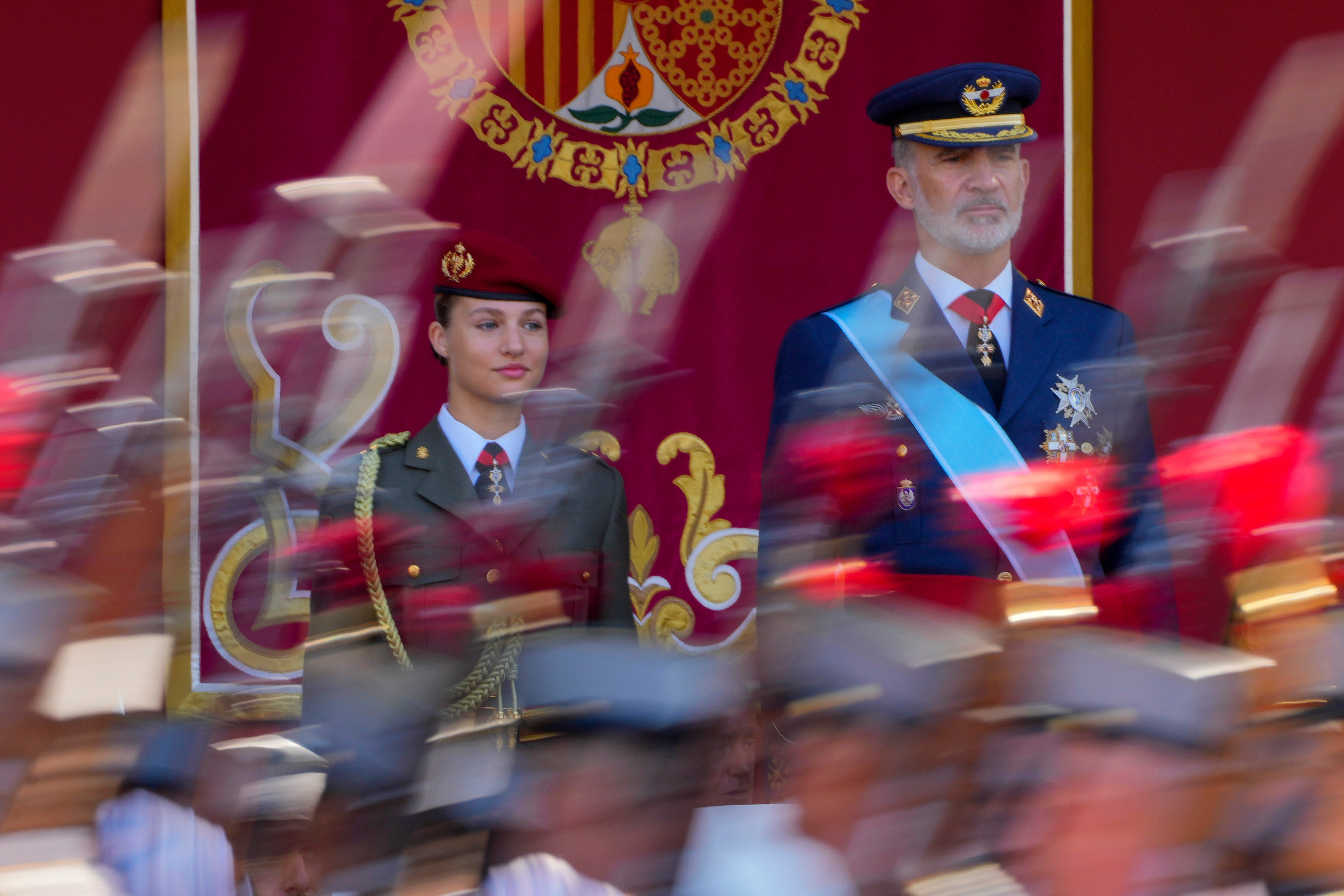Can the 18-year-old ‘pop princess’ set to become Spain’s future queen save the scandal-hit royal family?
Spain’s royal family has been beset by corruption claims and alleged marital scandals in recent years. But in the wake of ‘Leonormania’ – an outpouring of adoration for the teen heir – there’s renewed hope for the future reign of Princess Leonor. Graham Keeley reports from Madrid


With mounted royal guards wearing purple plumes, the pageantry in Spain resembled a coronation.
It was a sign of the popularity of Princess Leonor, who on Tuesday sealed her place as the country’s future queen.
As flag-waving crowds filled Madrid and millions watched on television, she swore loyalty to the constitution on her 18th birthday.
The completion of the parliamentary formality means she will be the next head of state if her father King Felipe VI of Spain falls ill, abdicates or dies.
Can Princess Leonor help rescue the Spanish royal family?
Spain was gripped by “Leonormania” as the princess’s face stared out from banners across the capital, special coins were made to mark the occasion and free cake emblazoned with the red and gold of the Spanish flag was handed out to royal watchers.
But the young princess has a big challenge on her hands. After years of the royal family being beset by scandal, can she restore its image and win over a sceptical public?
Barring revolution, Princess Leonor will one day become the first queen of Spain for more than 150 years, since her fourth great-grandmother Queen Isabella, who ruled between 1833 and 1868. She will be only the second queen in the history of unified Spain.
There is no doubt the royal household hopes the millennial princess – dubbed the “Pop Princess” by sections of the media – will reinforce the place of the monarchy in a nation which nearly 100 years ago, in 1931, voted to rid Spain of its kings and queens.
The Spanish House of Bourbon was reimposed on Spaniards by the late General Francisco Franco when the dictator nominated former king Juan Carlos as his successor.
In 1981, Juan Carlos showed he was on the side of democracy, not dictatorship, when he faced down coup plotters, ordering the army to return to barracks.
However, a series of royal scandals and the rise of pro-republican far-left parties have undermined the family’s legitimacy.
Once a hero who made Spaniards into Juancarlistas – if not monarchists – the 85-year-old king abdicated in 2014 amid accusations of financial wrongdoing and scandal around his private life.
It emerged that he had taken a secret elephant hunting trip to Botswana with his former mistress Corinna zu Sayn-Wittgenstein-Sayn, which outraged Spaniards who were struggling to make ends meet during an economic crisis.
London’s High Court last month dropped a £126m legal case brought by Ms Sayn-Wittgenstein-Sayn, who had accused Juan Carlos of directing a campaign of harassment against her after the relationship broke down in 2012, claims which he denied.
He was also accused in a recent book of fathering a secret daughter, another claim he denied. Other allegations about his prolific love life outside his marriage to Queen Sofia have gone unchallenged.
Prosecutors in Spain and Switzerland had also investigated Juan Carlos over his financial affairs after it was alleged he had pocketed millions while helping secure deals for Spanish businesses during his reign.
The investigations were shelved without any charges, but not until he had fled Spain to take exile in Abu Dhabi in 2020.

Princess Popular?
For now, Princess Leonor appears to have won over Spaniards. Nearly two-thirds said they backed the princess as the next monarch, according to a poll published by the centre-right El Mundo newspaper on Monday.
Royal watchers believe Princess Leonor may finally remove the stain of corruption from the Bourbons and make the monarchy relevant to Generation Z.
“I think the most important thing is Leonor knows how to connect with younger generations who obviously are not monarchists,” Pilar Eyre, a royal author, told The Independent.
Ms Eyre said the monarchy was safe for the foreseeable future as there was no political will to abolish the institution among mainstream political parties.
Princess Leonor’s progress from protected royal offspring to future head of state has been carefully stage-managed.
She gave her first public speech at the age of 13 in 2018. A year later, she gave another speech in Spanish, Catalan, English and Arabic at the Princess of Girona Foundation Awards in Barcelona.
Commentators believe she has inherited a sense of style from her mother, Queen Letizia, a former TV presenter. Both are darlings of the popular media in Spain. Reports suggest Leonor can also play tennis, sail and play the cello.
The princess studied abroad at the private UWC Atlantic College in Wales, dubbed “Hogwarts for Hippies” for its liberal regime and its buildings which resemble JK Rowling’s school for wizards.
She is now completing military service as a cadet at the military academy in Zaragoza in readiness for her role as commander-in-chief of the armed forces.
When she emerges from military training it is thought she has ambitions to study law at university.
Already the interest in Leonor’s “celebrity” appears to be taking over from her institutional role.
When she recently presented the Princess of Asturias Awards, Spain’s leading prizes for the arts and sciences, Paris Match magazine speculated about her Bulgari earrings.

Far-left ministers snub princess
Despite all the pomp at Princess Leonor’s parliamentary ceremony, the absences were more significant than the dignitaries present.
Not only was the former king missing. Three far-left ministers from Spain’s acting coalition government also snubbed the occasion along with the separatist parties from Catalonia and the Basque country, who profess themselves to be republicans.
It was a reminder that despite all the fanfare, Spain – unlike Britain – is not a nation of traditional monarchists.
Ione Belarra, acting minister of social rights and leader of the far-left Podemos party, the junior partner in the caretaker government, said no ministers from her party would attend the ceremony.
“The monarchy is trying to perpetuate itself in future decades and we want all institutions of state to be subject to the sovereignty of the citizens,” she posted on social media.
Juan Manuel García, a spokesman for the Republican State Assembly, said since 2015 government polls stopped asking questions about the popularity of the royal family after repeated surveys showed a majority wanted a referendum.
In August, a survey for the private pollsters Electomania found that 53 per cent of Spaniards preferred a republic, while 44 per cent supported the monarchy and 3 per cent did not have a view.
For now, the royal family has weathered the scandals that have engulfed the former king.
It remains to be seen if the appeal of the “Pop Princess” can win over the Spaniards.
Join our commenting forum
Join thought-provoking conversations, follow other Independent readers and see their replies
Comments
Bookmark popover
Removed from bookmarks